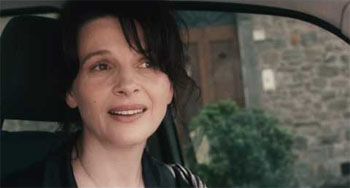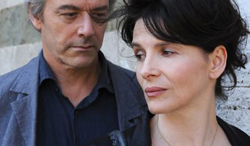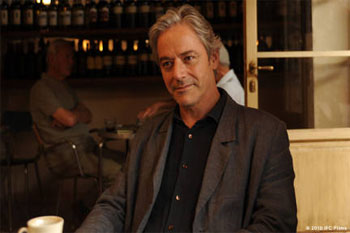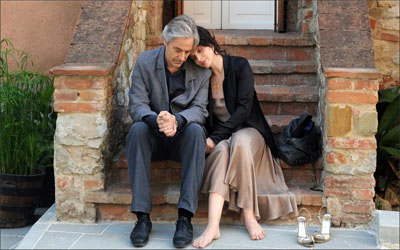Certified Copy (2010, Dir. Abbas Kiarostami):
“The movie started when he invited me to Tehran and one night he started talking about a story that happened to him in Italy, about a woman unhooking her bra, and I didn’t know where it was going. At the end, he said, do you believe me, and he said, well it’s not true.”
— Juliette Binoche
“I don’t give the answers. I just ask the question.”
— Abbas Kiarostami
Is there such a thing as a counterfeit story? If you believe that stories can be truthful, yes. The very nature of storytelling suggests otherwise. As soon as something is picked up on and related to someone else, the teller applies his or her craft, whether it’s picking out a specific juicy detail, setting the tone and texture of the telling, deciding on where to begin and end. The act of storytelling is a transformative gesture, where the idea of truth is secondary to the experience of hearing the tale. And yet, in films, a defiantly visual and aural medium, we are constantly served what is meant to be perceived as truth, or at least we’ve come to expect it. Everything must be explicated; everything must fit within a whole; anything that suggests that there’s no single interpretation at the heart of things is dismissed as precious wankery.
 So here we are, face to face with Certified Copy, the latest from Iranian filmmaker Abbas Kiarostami, and the film’s notions of truth and facsimile are front-and-center: “A copy has its worth as it leads us back to the original and is verified by it,” says James Miller (William Shimell). Well-spoken, self-deprecating, a guest at a Florentine literary reading, he is showing off his new book Certified Copy (his preferred title: “Forget the Original, Get a Good Copy”), which purports to examine how copies of artistic works are valid in their own right. In the audience is a woman (Juliette Binoche) and what appears to be her restless son. The woman leaves a message for Miller to meet her, and shortly afterwards the two are motoring off into a brilliantly sunny Tuscan afternoon. Ah, romance in Italy! But anyone who’s watched Kiarostami’s previous films knows that the act of driving brings neither freedom nor peace, but confusion and miscommunication. Sure enough, our couple is ill-at-ease: he’s ready to move on from talk of copies and reproductions, and instead trots out bad jokes about genies and platitudes about living simply; she’s burdened with the not-so-simple domestic toils of raising a kid, as well as her job as antique store proprietor (caretaking copies), and takes on an almost reproachful attitude towards him, even though they’ve just met.
So here we are, face to face with Certified Copy, the latest from Iranian filmmaker Abbas Kiarostami, and the film’s notions of truth and facsimile are front-and-center: “A copy has its worth as it leads us back to the original and is verified by it,” says James Miller (William Shimell). Well-spoken, self-deprecating, a guest at a Florentine literary reading, he is showing off his new book Certified Copy (his preferred title: “Forget the Original, Get a Good Copy”), which purports to examine how copies of artistic works are valid in their own right. In the audience is a woman (Juliette Binoche) and what appears to be her restless son. The woman leaves a message for Miller to meet her, and shortly afterwards the two are motoring off into a brilliantly sunny Tuscan afternoon. Ah, romance in Italy! But anyone who’s watched Kiarostami’s previous films knows that the act of driving brings neither freedom nor peace, but confusion and miscommunication. Sure enough, our couple is ill-at-ease: he’s ready to move on from talk of copies and reproductions, and instead trots out bad jokes about genies and platitudes about living simply; she’s burdened with the not-so-simple domestic toils of raising a kid, as well as her job as antique store proprietor (caretaking copies), and takes on an almost reproachful attitude towards him, even though they’ve just met.
Or have they? Upon taking a break in a cafe in the local village, the film unexpectedly breaks open. Miller recounts the story of watching a woman walking down the street, her child trailing behind, the two of them never walking together, and the woman grows unaccountably upset, muttering the gnomic words: “I wasn’t well then.” When Miller goes outside to take a call, the cafe proprietor, assuming the two of them are married, offers conciliatory words, and the woman plays along. Then, the switch is pulled: the proprietor whispers unheard words into the woman’s ear, and when Miller returns, the dynamics of their relationship have shifted. Where previously they spoke in pinched, polite English, they now trade barbs, both affectionate and hurtful, in English and French. They also now seem to have a shared history, a mutual acknowledgment that they were married but are now estranged. And yet, their supposed past together seems elusive, impossible to pin down. She takes him to task for falling asleep on their anniversary night, he recalls an incident in which she fell asleep at the wheel, and both deny the other’s rendition of the tale.
 “I can’t believe you’re so sentimental.”
“I can’t believe you’re so sentimental.”
“I can’t believe you’re so irresponsible.”
Aha, you think — so this is one of those puzzle movies in which we’ll figure out by the end what the deal is. Are they merely playacting? Are they an estranged couple trying to recapture the old spark with a day out in the town where they got married? (At least, she acts as if they were married here.) If you take that approach, you’ll be severely disappointed, as every clue that this couple may or may not have a history, or may or may not be together, only leads to further obfuscation, like looking at one’s reflection through mirrors mounted opposite each other. Indeed, mirrors and frames are everywhere — Shimell is often isolated in doorways, behind glass, or against window frames, as if he’s been caught onstage in a particularly devious theatrical production, and often Kiarostami shoots scenes so that the action occurs in a reflection, whether it’s beyond a window just outside our view, or contained in a motorcycle mirror. When the couple drive out of Florence, the rooftops above rain their reflections onto them through the windshield, while the space between them is yawning blue sky, a neat visual representation of the distance between them. Eventually Binoche and Shimell address each other directly, and they are filmed addressing the camera — we have become their reflections, inextricably caught up with their fantasies/realities.
All the while, the beauty of Tuscany is shoved almost completely out of the frame. She gets chummy with local newlyweds and tries in vain to recapture the blush of first romance, but the married couple is filmed only in long angles or through streaked windows; he gets dragged to one of those charming local restaurants you see in travel guides, where he endures appalling service and even more appalling red wine. A quarrel over a statue of David in the town square is distilled to dueling interpretations, her compassionate view of human interdependence (a woman resting her head on David’s shoulder) butting heads with his more internalized, pragmatic approach (“It’d be stupid to ruin our lives for an ideal,” he says), and all the while we never get a clear shot of the object under debate.
 Aha, you think — so this movie is a head game about the subjectivity of cinema, people lobbing abstract ideas at each other. How European. It would be easy to jump to that conclusion, especially given the work of authors/directors such as Alain Robbe-Grillet, who made a career out of “did it happen or didn’t it?” conundrums. And yet, like Robbe-Grillet’s best work, a curious thing happens as the story progresses: instead of growing chillier as the truth becomes more elusive, the film grows warmer, more suspenseful, more personal. As Miller and the woman hash out their versions of the past and argue over them, we are drawn into their storytelling, the eternal push-pull between feminine desire and masculine self-absorption, responding to emotions that may or may not be genuine, but such is the power of film, which is a “certified copy” in of itself, with actors, camerawork, settings and dialogue enforcing an illusion that provokes genuine responses.
Aha, you think — so this movie is a head game about the subjectivity of cinema, people lobbing abstract ideas at each other. How European. It would be easy to jump to that conclusion, especially given the work of authors/directors such as Alain Robbe-Grillet, who made a career out of “did it happen or didn’t it?” conundrums. And yet, like Robbe-Grillet’s best work, a curious thing happens as the story progresses: instead of growing chillier as the truth becomes more elusive, the film grows warmer, more suspenseful, more personal. As Miller and the woman hash out their versions of the past and argue over them, we are drawn into their storytelling, the eternal push-pull between feminine desire and masculine self-absorption, responding to emotions that may or may not be genuine, but such is the power of film, which is a “certified copy” in of itself, with actors, camerawork, settings and dialogue enforcing an illusion that provokes genuine responses.
Rather than giving us a cold deconstruction of that idea, Kiarostami instead gets playful — he has always been a director of ideas, flirting with subjective viewpoints and unanswerable enigmas, preferring to lay his films at the audience’s feet and letting them come up with their interpretations. (Did the woman turn around at the end of Through the Olive Trees? Did the man die at the end of A Taste of Cherry?) Certified Copy might be his most playful, humane film since 1999’s Where the Wind Will Carry Us, and what lingers are moments of sincere intimacy: a hand laid gently on the shoulder for a few seconds, or knowing someone’s shaving habits. Genuine emotion too: Binoche retreats to a church to remove her bra, as a possible prelude to a tryst with Shimell, and her action is balanced by the simple, tender sight of an elderly couple (what Shimell and Binoche might be in a few decades) escorting each other home from service. Then there is the bittersweet conclusion in which Binoche drags Shimell into the pension where they spent their honeymoon (or so she claims, he can’t remember), and asks him to look out the window at something. We never see what’s outside the window, only his reaction — there is nothing there, or at least nothing that jars any memories — and then we see Binoche on the bed, winsome, desirous, hoping against all hope that the illusion of love between them will appear, or reappear.
 “I don’t know where we are, we’re just meandering without a goal.”
“I don’t know where we are, we’re just meandering without a goal.”
“That’s fine with me.”
All the above would be fine for a brainy few hours at the cinema, but it wouldn’t work nearly as well without committed actors. Shimell, an opera star in real life, isn’t required to be much more than reactive and sometimes querulous, but he brings a crisp gravity to his character. The film really belongs to Binoche, and it’s the best part she’s had in ages — for all the talk of reality and reproduction, when she gussies herself up in a bathroom mirror, plops down in front of her would-be husband with a look of pure happiness, and tears up a few minutes later when he neglects to comment about her appearance, we can revel in the simple pleasure of bravura acting. Worried, combative, coquettish, sometimes dowdy and frazzled, sometimes gorgeous, Binoche is like the butterfly pendant her character wears about her neck, fluttering free, and Certified Copy follows suit, breaking out of convention, leaving us in a bemused and amused state of mind, open to all sorts of possibilities — and how often do we get that in movies these days?

